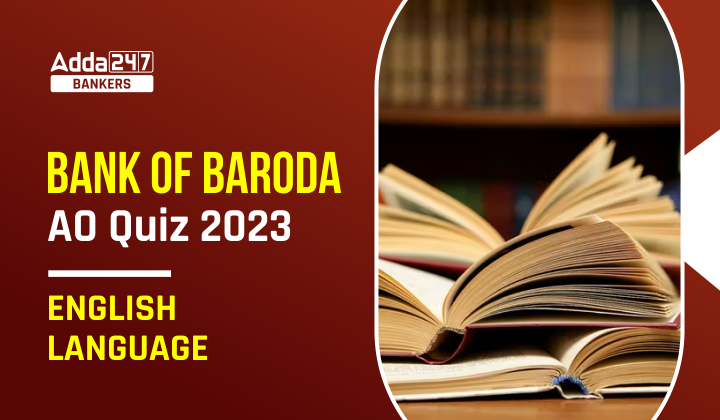Directions (1-5): In the questions given below, there is a sentence in which one part is given in bold. The part given in bold may or may not be grammatically correct. Choose the best alternative among the four given which can replace the part in bold to make the sentence grammatically correct. If the part given in bold is already correct and does not require any replacement, choose option (e), i.e. “No replacement required” as your answer.
Q1. Supreme Court had correctly deduced whether the spate of lynchings and emboldening of mobs is a law and order issue needing administrative redress.
(a) Supreme Court had correctly deducing that
(b) Supreme Court has correctly deduced whether
(c) Supreme Court has been correctly deduced that
(d) Supreme Court has correctly deduced that
(e) No replacement required
Q2. Electric power is the way to go for the transport sector, gave the need to curbinggreenhouse gas emissions and air pollution.
(a) to give the need to curbing the
(b) to give the need to curb
(c)given the need to curb
(d) gave the need to curb
(e) No replacement required
Q3.This Independence Day, when Prime Minister NarendraModi announced India’s manned space mission by 2022, among the surprising were Indian Space Research Organisation (Isro) scientists.
(a) among those surprised were
(b) between the surprised were
(c) amongst the surprised are
(d) with those surprising are
(e) No replacement required
Q4. It was the curiosityto know of the reason for behind the fall of an apple which made Isaac Newton invent the Laws of Motion.
(a) of knowing the reason for
(b) of knowing the reason
(c) to know of the reason
(d) for knowing of the reason
(e) No replacement required
Q5. It is not only the change but ‘the rate of change’ also that is increasing as we are moving forward in the journey of human evolution.
(a) we have been moving forward on
(b) we have moved forward to
(c) we were moving forward to
(d) we had moved forward in
(e) No replacement required
Q6. In the questions given below, some sentences/phrases are given, out of which one may or may not be grammatically correct. Find the grammatically correct sentence/phrase out of the given options. If all of the given sentences/phrases are correct, mark option (E) i.e. “All are correct” as your answer.
(a) Where do you leave at the moment?
(b) They killed Tom as an example to the other prisoners.
(c) He gave an explanation about for he had been absent.
(d) The present prime minister was not present to the ceremony.
(e) All are correct
Q7. In the questions given below, some sentences/phrases are given, out of which one may or may not be grammatically correct. Find the grammatically correct sentence/phrase out of the given options. If all of the given sentences/phrases are correct, mark option (E) i.e. “All are correct” as your answer.
(a) The principal presented each of the graduate with diploma.
(b) She was taken out by that fake gold certificate scandal and lost most of her money.
(c) Modern cars differ from the early ones in many ways.
(d) The actual price was lower than I thought it will be.
(e) All are correct
Q8. In the questions given below, some sentences/phrases are given, out of which one may or may not be grammatically correct. Find the grammatically correct sentence/phrase out of the given options. If all of the given sentences/phrases are correct, mark option (E) i.e. “All are correct” as your answer.
(a) I can’t confirm that that’s the actual number of deaths.
(b) Preventive measures are much more effective then the actual treatment.
(c) In order to avoid being unjust, the judge kept all decision logical and objective.
(d) The witness weren’t able to describe the robber.
(e) All are correct
Q9. In the questions given below, some sentences/phrases are given, out of which one may or may not be grammatically correct. Find the grammatically correct sentence/phrase out of the given options. If all of the given sentences/phrases are correct, mark option (E) i.e. “All are correct” as your answer.
(a) The article recounted the events for the past year.
(b) A known mistake is preferred than an unknown truth.
(c) The moon as well as the stars give us light at night.
(d) Although he had many toys, his greed made him want more.
(e) All are correct
Q10. In the questions given below, some sentences/phrases are given, out of which one may or may not be grammatically correct. Find the grammatically correct sentence/phrase out of the given options. If all of the given sentences/phrases are correct, mark option (E) i.e. “All are correct” as your answer.
(a) What other options do we have?
(b) I’d never been to Boston before.
(c) He has never been scolded by his father.
(d) A newspaper tells us what is happening in the world.
(e) All are correct
Directions (11-15): Rearrange the following sentences to form a meaningful paragraph and then answer the questions given below them.
(A) Close to 82% of workers with secondary education, 76.5% of those with higher secondary education, 48% of graduates and 45% of postgraduates in the industry are employed in jobs that require lower education levels.
(B) If it wasn’t already clear that India is walking a tightrope between demographic dividend and demographic disaster, a new working paper from Icrier, by PrateekKukreja, provides fresh evidence of this.
(C) Using data from the 68th round of the NSS Employment and Unemployment survey, Kukreja shows that the educational mismatch where a worker’s level of education is either lower or higher than the standard required to carry out her work in India’s textiles and clothes (T&C) industry stood at a whopping 68% in 2011-12.
(D) This mismatch ratio is much higher than the overall educational mismatch ratio in Europe (33%) and even Turkey (54%).
(E) While 26% of the T&C workers in India were employed in jobs that required no formal education, 88% in ones that require upto eight years of education and 4% in jobs that require graduation or higher levels of education, the proportion of over-educated workers is drastically high.
Q11. Which of the following is the THIRD sentence of the coherent paragraph?
(a) B
(b) A
(c) D
(d) F
(e) None of these
Q12. Which of the following is the SECOND sentence of the coherent paragraph?
(a) B
(b) A
(c) D
(d) F
(e) None of these
Q13. Which of the following is the FIRST sentence of the coherent paragraph?
(a) B
(b) A
(c) D
(d) F
(e) None of these
Q14. Which of the following is the FOURTH sentence of the coherent paragraph?
(a) B
(b) A
(c) D
(d) E
(e) None of these
Q15. Which of the following is the FIFTH sentence of the coherent paragraph?
(a) B
(b) A
(c) D
(d) F
(e) None of these
Solutions
S1. Ans. (d)
Sol. The most appropriate phrase to replace the highlighted phrase to frame a grammatically viable and contextually meaningful sentence is “Supreme Court has correctly deduced that”. It is to be noted that “whether” is used to express a doubt or choice between alternatives. Hence, option (d) is the most suitable answer choice.
S2. Ans. (c)
Sol. The most appropriate phrase to replace the highlighted phrase to frame a grammatically viable and contextually meaningful sentence is “given the need to curb”. Hence, option (c) is the most suitable answer choice.
S3. Ans. (a)
Sol. The most appropriate phrase to replace the highlighted phrase to frame a grammatically viable and contextually meaningful sentence is “among those surprised were”. Between is used when naming distinct, individual items (can be 2, 3, or more) while among is used when the items are part of a group, or are not specifically named. Hence, option (a) is the most suitable answer choice.
S4. Ans. (b)
Sol. The most appropriate phrase to replace the highlighted phrase to frame a grammatically viable and contextually meaningful sentence is “of knowing the reason”. Hence, option (b) is the most suitable answer choice.
S5. Ans. (e)
Sol. The given sentence along with the highlighted phrase is grammatically correct and contextually meaningful. Since it does not require any replacement, option (e) becomes the most suitable answer choice.
S6. Ans. (b)
Sol. All the sentences are incorrect except for sentence (b). In sentence (a) “leave” should be replaced by ‘live” to frame a contextually meaningful sentence. In sentence (b) “for” should be replaced by “why”. To correct sentence (d), replace the preposition “to” with “at” as ‘at’ is used to refer the exact addresses or intersections, we use the preposition at. Therefore, option (b) is the most suitable answer choice.
S7. Ans. (c)
Sol. All the sentences are grammatically incorrect except for sentence (c). In sentence (a) ‘graduate’ should be replaced by its plural form “graduates”. In sentence (b), there is an error of phrasal verb. “Taken out” should be replaced by “taken in” as it means to deceive or swindle someone. In sentence (d) It should be noted that if you are writing about past events, you use ‘would’ to indicate something that was in the future at that point in time, but is not necessarily in the future right now. In other words, you use would to preserve the future aspect when talking about the past. Therefore, ‘will’ should be replaced by ‘would’. Therefore, option (c) is the most suitable answer choice.
S8. Ans. (a)
Sol. All the sentences are grammatically incorrect except for sentence (a). In sentence (b) “then” should be replaced by “than”. In sentence (c) since the determiner “all” has been used the noun associated to it should be in its plural form. Therefore, “decision” should be replaced by “decisions”. In sentence (d), since “witness” is used in its singular form the verb should be “wasn’t”. Thus, since all the sentences are incorrect except for sentence (a), option (a) becomes the most suitable answer
choice.
S9. Ans. (d)
Sol. All the given sentences are incorrect except for sentence (d). In sentence (a) “for” should be replaced by “of”. In sentence (b) “preferred” should be replaced by “better” ; or “than” should be replaced by “over”. In sentence (c), “give” should be replaced by “gives” as well as does not make the subject plural, therefore, the verb linked to the subject should be singular as well. Since, only sentence (d) is grammatically correct, option (d) becomes the most suitable answer choice.
S10. Ans. (e)
Sol. All the given sentences are grammatically correct and contextually meaningful, therefore, option (e) becomes the most suitable answer choice.
S11. Ans. (c)
Sol. The sentence can be arranged in the logical sequence as BCDEA as the paragraph is describing about the study that reveals gap between the skills available and skills required. Since, sentence (D) is the third sentence, option (c) is the most suitable answer choice.
S12. Ans. (e)
Sol. The sentence can be arranged in the logical sequence as BCDEA as the paragraph is describing about the study that reveals gap between the skills available and skills required. Since, none of the given options mentions sentence (C), option (e) becomes the most suitable answer choice.
S13. Ans. (a)
Sol. The sentence can be arranged in the logical sequence as BCDEA as the paragraph is describing about the study that reveals gap between the skills available and skills required. Since, sentence (D) is the first sentence; option (a) is the most suitable answer choice.
S14. Ans. (d)
Sol. The sentence can be arranged in the logical sequence as BCDEA as the paragraph is describing about the study that reveals gap between the skills available and skills required. Since, sentence (D) is the fourth sentence, option (d) is the most suitable answer choice.
S15. Ans. (b)
Sol. The sentence can be arranged in the logical sequence as BCDEA as the paragraph is describing about the study that reveals gap between the skills available and skills required. Since, sentence (D) is the fifth sentence, option (b) is the most suitable answer choice.
Click Here to Register for Bank Exams 2021 Preparation Material





 आईबीपीएस ने AI एप्लीकेशन डेवलपर पदों पर ...
आईबीपीएस ने AI एप्लीकेशन डेवलपर पदों पर ...
 RB Group D Recruitment 2026: 22,195 पदों...
RB Group D Recruitment 2026: 22,195 पदों...
 RBI ऑफिस अटेंडेंट एग्जाम एनालिसिस 2026 (...
RBI ऑफिस अटेंडेंट एग्जाम एनालिसिस 2026 (...










